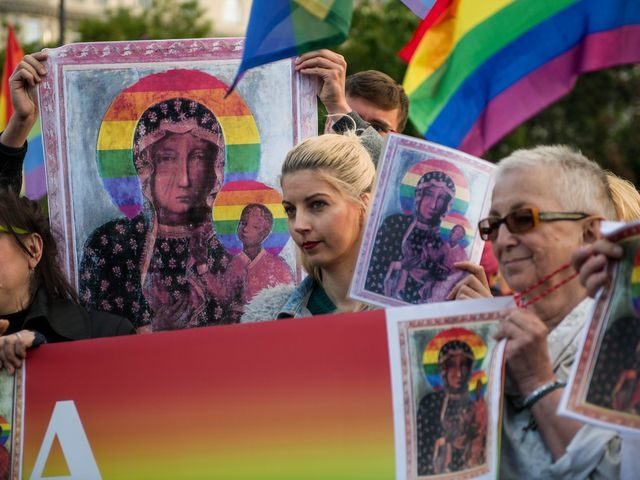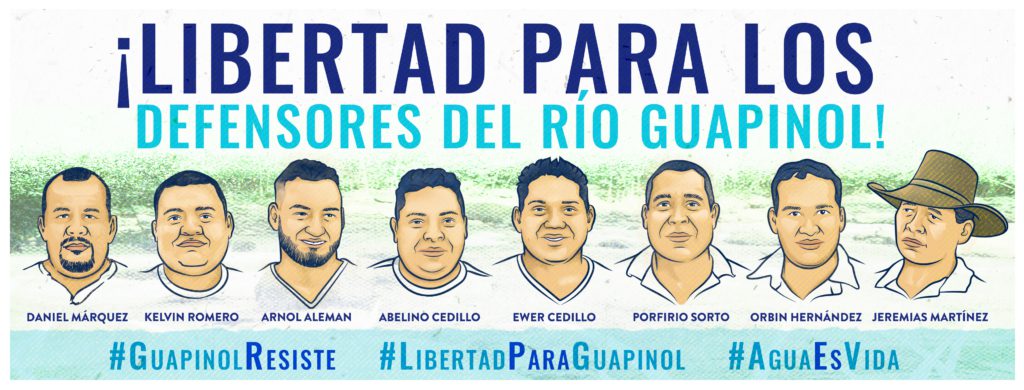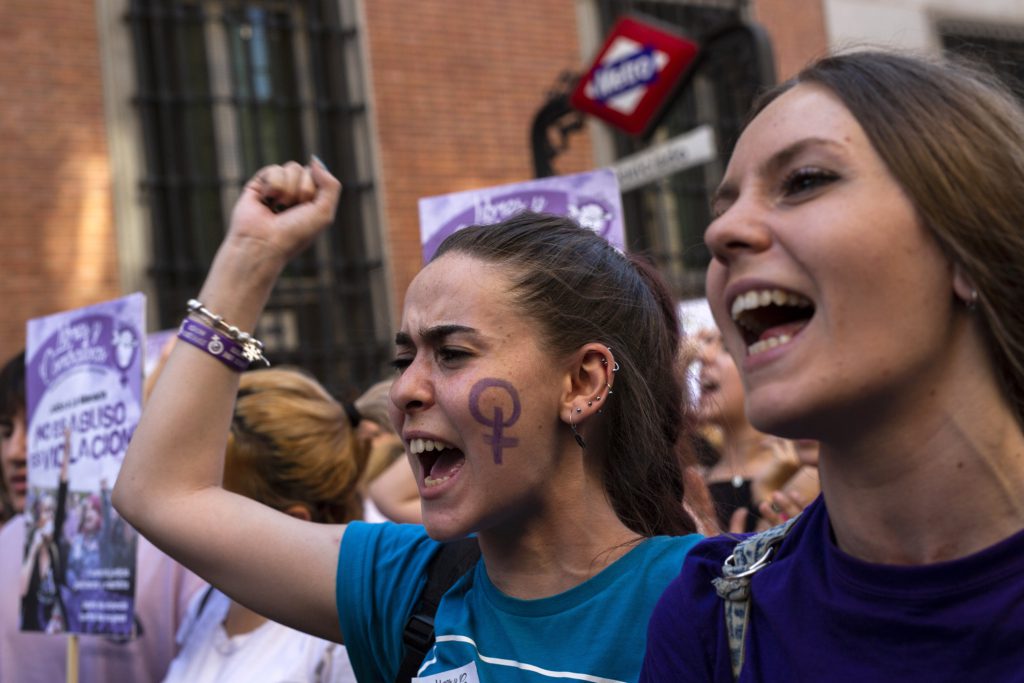We’ve reached the midway point of 2022 and, as ever, it’s been a busy year for Amnesty International. With the world facing human rights challenges on so many fronts, one can easily lose sight of the many positive changes that have taken place across the globe over the past six months. Thanks to the tireless commitment of our supporters, Amnesty International has helped to free the wrongfully imprisoned, rewrite unjust laws, and hold the powerful to account. Here’s a round-up of human rights victories to celebrate so far this year…
A Polish court dismissed an appeal against the acquittal of three women who had been accused of ‘offending religious beliefs’ for distributing posters of the Virgin Mary with an LGBTI rainbow halo. More than 276,000 actions were taken on their behalf by Amnesty supporters.
 ©Attila Husejnow/SOPA Images/LightRocket via Getty Images
©Attila Husejnow/SOPA Images/LightRocket via Getty ImagesThe abolition of the death penalty for all crimes in Kazakhstan came into force — a significant win for Amnesty’s campaign for the global abolition of the punishment. Kazakhstan, which became the 109th fully abolitionist country, also went on to become a state party to a key international treaty on abolition in March.
The US Department of Defense published the findings of an independent RAND Corporation investigation it commissioned into the Pentagon’s civilian casualty reporting practices. The investigation was prompted, in part, by Amnesty’s reporting on civilian casualties caused by US & Coalition forces in Raqqa, Syria in 2017; our multimedia investigation War in Raqqa: Rhetoric versus Reality is cited multiple times in RAND’s report.
Ghana’s Parliament rejected a bill that would have further criminalized LGBTI people, introduced prison sentences for anyone expressing support or “sympathy” toward LGBTI people, and encouraged conversion therapy and gender “realignment” for children. Opposition to the bill came from groups including Amnesty International, who criticized it before the Parliament.
In Afghanistan, Professor Faizullah Jalal, who had been arbitrarily arrested and detained by the Taliban, was freed following campaigning by Amnesty International and others. His daughter said that his release would not have been possible without Amnesty’s intervention.
After nearly 30 years of advocacy and campaigning by Amnesty International Slovenia, the country’s President finally issued a public apology to the thousands of people from other former Yugoslav republics whose residency permits were revoked after Slovenia declared independence in 1992. The so-called “erasure” left some 26,000 people without residency and economic and social rights, depriving them of health and social benefits.
The Kuwaiti Constitutional Court overturned a law criminalizing “imitation of the opposite sex,” legislation that Amnesty International had previously criticized in its Annual Report.
Following a long-term campaign by Amnesty International and other civil society organizations, Colombia decriminalized abortion during the first 24 weeks of a pregnancy. This achievement further boosted the momentum behind the movement for sexual and reproductive rights across Latin America, following the legalization of abortion in Argentina in 2020 and the decriminalization of abortion in Mexico 2021.
In Honduras, the “Guapinol eight”, water rights defenders and prisoners of conscience, were unconditionally released after two and a half years. Amnesty International carried out media, advocacy and campaigning work for more than a year to highlight their wrongful detention.
 © guapinolresiste.org
© guapinolresiste.orgDipti Rani Das, a 17-year-old girl from Bangladesh’s Hindu minority, was released after spending more than 16 months in detention for a Facebook post. Amnesty International issued an Urgent Action on her behalf and provided relief support for her legal expenses.
The UNHRC renewed the mandate of the Human Rights Commission on South Sudan, which is currently the only independent mechanism capable of collecting evidence for future accountability. Amnesty International actively advocated for its renewal through joint public letters to UNHRC member states, bilateral meetings with UNHRC member states and section engagement at capital level.
Two individuals recently featured in Amnesty International’s annual Write for Rights Campaign were released from prison. Bernardo Caal Xol, an Indigenous Mayan environmentalist and prisoner of conscience in Guatemala, was freed early after being wrongfully imprisoned for his activism. And, in South Sudan, Magai Matiop Ngong, who was a 15-year-old school student when sentenced to death in 2017, was released after the High Court ruled he was a child at the time of his alleged crime.
In 2018, Amnesty International launched a campaign on behalf of Tayebe Abassi, a then 18-year-old girl whose family faced being deported to Afghanistan from Norway, where they had lived since 2012. In April, Tayebe’s mother finally received a residency permit, giving her the right to stay with her children in Norway. Tayebe shared the following message to thank Amnesty International for its support:
“I wanted to ask you if that’s possible I could send my thankful message to Amnesty International and everyone who supported me and my family during our struggle. Looking back in time makes me feel strong and powerful, I found all of those support cards that I got from different Amnesty members around the world ❤❤” – Tayebe

In Libya, Mansour Atti, a journalist, blogger and head of the Red Crescent Committee and of the Civil Society Commission, was released ten months after his enforced disappearance. Amnesty International issued an urgent action, public statement and press release on his case and encouraged members and supporters to sign petitions, send letters and post on social media to call for his immediate and unconditional release.
In another win for the long-running campaign by Amnesty International and others for the global abolition of the death penalty, Papua New Guinea became the latest country to abandon the punishment, 30 years after its reintroduction in 1991.
Following months of advocacy and campaigning by Amnesty International and other civil society organizations, the European Union reached political agreement on the Digital Services Act (DSA). This landmark regulatory framework will, among other things, require Big Tech platforms to assess and manage systemic risks posed by their services, such as advocacy of hatred and the spread of disinformation.
In response to research by Amnesty International and partners, Mali’s authorities launched an investigation into an ‘anti-terrorist operation’ in the city of Moura, carried out by Mali’s armed forces and mercenaries from the Wagner group, that left at least 203 people dead. Based on eyewitness testimonies, Amnesty International’s joint-research had concluded that dozens of civilians were killed during the operation and that many people were unlawfully killed.
In a success for the women’s movement in Spain and for Amnesty International activists, who long campaigned for it, the lower chamber of Spain’s parliament passed a bill containing important measures to prevent, protect and prosecute rape. The law puts consent at the centre of the discussion around sexual violence, including rape.
 Pablo Blazquez Dominguez/Getty Images
Pablo Blazquez Dominguez/Getty ImagesThe UN Security Council (UNSC) renewed the arms embargo on the territory of South Sudan for another year. Amnesty International contributed to this result through research and targeted advocacy, including bilateral meetings with UNSC members during an advocacy mission to New York in April and section engagement at capital level.
A day after the launch of Amnesty International’s annual death penalty report, Zambia’s President announced that the country would begin the process of abolishing the death penalty.
In Guinea, a judicial investigation was launched against former political and police leaders for violations of the right to life, enforced disappearances, arbitrary detentions, and torture following the country’s constitutional crisis in 2020. Amnesty International has called repeatedly for an end to the impunity for these violations, publishing a report and multiple other outputs condemning the unlawful killings of dozens of demonstrators and the arbitrary detention of dozens of political activists and civil society representatives.
In a positive step for the right to freedom of expression in India, the country’s Supreme Court suspended the 152-year-old sedition law.
In a move long advocated by Amnesty International, States, civil society, and international organizations gathered in Geneva to finalize the text of a political declaration aimed at strengthening the protection of civilians arising from the use of explosive weapons in populated areas. It is expected that states will sign onto the political declaration at a diplomatic event later this year.
Amnesty International’s ongoing campaign on the death penalty saw further success, with an announcement by Malaysia’s government that it would begin the process of abolishing the mandatory death sentence that currently exists for 11 offences.
Contact Us
Regional - Américas
Calle Luz Saviñón 519, Colonia del Valle Benito Juárez, 03100. Ciudad de México, México
Global
1 Easton Street, London WC1X 0DW. Reino Unido.